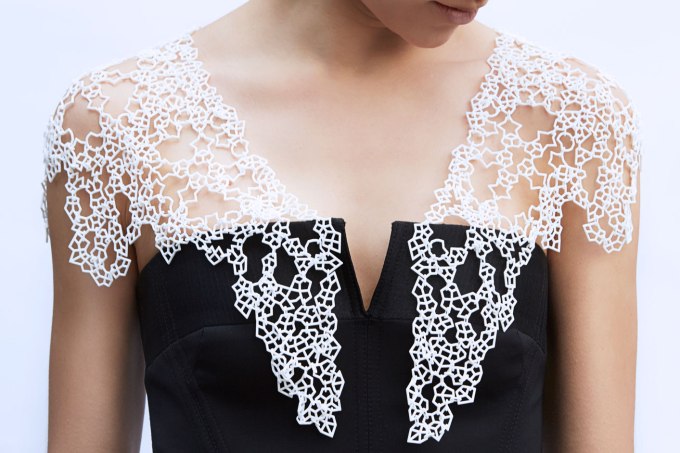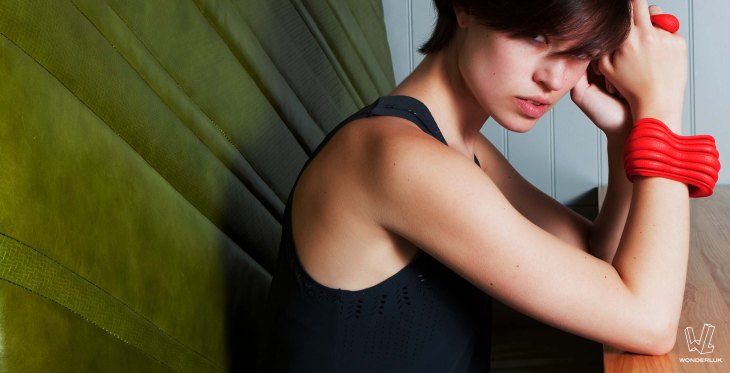Custom 3D printed clothes that fit like a glove and mean you’ll never have the tedium of traipsing into a changing room ever again are still likely years out. But the fashion space is dabbling with 3D printing technology. And there are other moves afoot to harness the power of on-demand additive manufacturing to produce custom designs.
One such mover and shaker is U.K. startup WonderLuk, founded in July last year, which is using 3D printing to power a marketplace business for bold and unusual accessories that can be further customized by the buyer. Think statement pieces, rather than normcore.
It has seven designers on its books so far creating unusual items of jewelry and other accessories — designs which in some instances are only practical to manufacture using the 3D printing technique, says co-founder and CEO Roberta Lucca — which are then printed on demand and shipped to buyers within two weeks. The business model is a revenue share with designers who sell via its marketplace.
The website opened for business back in April, and there’s around 60 products on sale so far (see gallery below for some of its current designs). It’s not breaking out customers yet but Lucca says cumulative visitors so far are more than 20,000, with visitor numbers growing “week on week”.
Pricing is generally more expensive than mass-produced high street chain accessories but undercutting the cost of one-off designer or bespoke pieces. It’s also faster than the latter, thanks to using 3D printing as the manufacturing method, with custom-tweaked designs able to arrive in buyers’ hands within weeks. Some 80% of WonderLuk buyers request some form of personalizing to designs, according to Lucca.
Accessories on WonderLuk are printed from nylon but the startup is currently testing other materials to more squarely address the luxury category — with 18k gold and titanium samples on its workbench at present. (Silver is sadly technically harder to do but Lucca says she’s keen to add it if the printing challenges can be overcome.) It also plans to expand the categories of products it offers to include items such as shoes and homeware in the near future, with a little dabbling with 3D printing clothing also on the cards.
Both WonderLuk’s co-founders (Andre Schober being the other) have prior experience in the luxury fashion category, having worked at luxury phone brand Vertu.

“The reason we started with jewelry is it’s a little less challenging… from an ecommerce perspective. From a fitting perspective as well — jewelry, accessories — then we’ll go into shoes, and then we go into homeware, and then we go into clothing,” Lucca tells TechCrunch
“I can tell you that wearable clothing, 3D printed, it’s probably about five years away from now. I wouldn’t be that optimistic on this side. But what we have tried and experimented with one of our designers is combining certain elements of your outfit to your dress, so for instance we did some sort of a cape that looks like a lace. That was all 3D printed in one go and it’s really nice and soft, and anyone can wear that on top of any dress and it looks stunning. So those things are very much our embryonic experimentation with clothing.”
Challenges that need to be overcome for 3D printing clothes include finding materials that can produce clothes that are warm enough to wear, says Lucca, and also overcoming the omnipresent ecommerce issue of ensuring fit without the buyer being there to physically try something on — which has itself spawned myriad tech startups.
“It’s a combination of things. Right now there isn’t any 3D printed material that could functionally warm you. So that’s something really basic about our clothing that it needs to warm you. And all materials that are available right now they would not do it,” says Lucca. “But also the fitting, from an online perspective, you need to be evolved. Fitting is a major thing for any ecommerce business.”
WonderLuk is using a U.K. based 3D printing supplier to fulfill orders but Lucca says she wants to identify local suppliers as the business expands to more markets globally. “I’m keen to make sure that we don’t make products traveling thousands of miles every day. I want to make sure that once we’re present in the U.S., for instance, I have the right suppliers there to fulfill all of the orders locally,” she adds.
In terms of competitors, she likens the 3D printing marketplace business model to Shapeways generally, although WonderLuk is — at least for now — focused more narrowly, since it’s targeting the fashion vertical. Another competitor she names for the online accessories ecommerce piece is Boticca, although noting they don’t offer 3D printing.
WonderLuk has just closed a £150,000 ($240,000) seed round of funding, from Symvan Capital. It’s now in the process of raising a Series A to scale up on all fronts, says Lucca. “We are basically expanding customers, expanding the platform, expanding the designer base, expanding the team, so we are all about growing,” she adds. “Growing everything.”
[gallery ids="1070675,1070676,1070677,1070678,1070679,1070680,1070681,1070682,1070683,1070684"]
